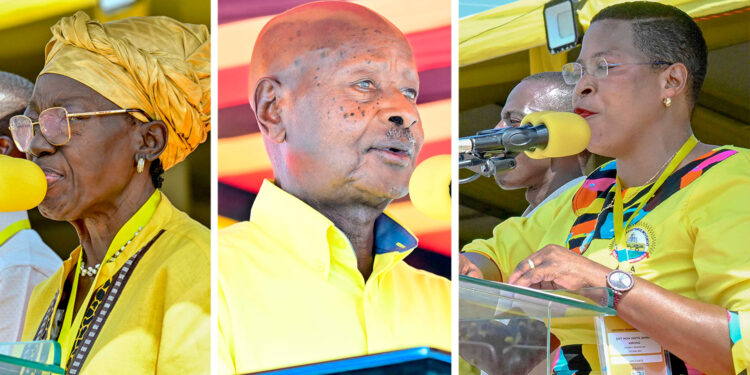The defeat Rebecca Kadaga, the first Deputy Prime Minister, suffered at the hands of Speaker Anita Among is symbolic of her innocence, obscured by the shadows of shifting allegiances within the hollowed out NRM party, where President Museveni remains the sole master of his own destiny.
A master of Machiavellian statecraft, Museveni once again proved that the rest of the cadres, including Kadaga, are mere cogs in the unrelenting machine where the survival of the state entirely depends on ‘one man’s vision.’
Kadaga, who previously served as the Speaker of Parliament until 2021, was soundly rejected for the coveted role of second vice-chairperson of the ruling party—a position ring-fenced for female contestants. She secured a paltry 7.2 percent against her implacable foe, the Speaker of Parliament, Anita Among, who received 92 percent of the vote.
This was the second time Kadaga, a long-time cadre of the ruling party who had risen from the NRM party’s lower rungs to become the first post-independence female Speaker, was resoundingly beaten and humiliated. Before her appointment as Speaker, Kadaga had served as the Deputy Speaker to Edward Ssekandi for two terms from 2001 to 2011. She demanded that Ssekandi step aside after serving two consecutive terms—a wish that was granted when she was appointed Speaker in 2011 and Ssekandi was appointed the Vice-President. Earlier on in 2005, Kadaga used her shrewd judgement during the NRM delegates conference at the Mandela National Stadium, Namboole, to demand that then Labour minister, ‘a novice NRM cadre’ Zoe Bakoko Bakoru, who had thrown a hat in the ring for the position of second-vice chairperson, step aside. The political pendulum swung in the favour of Kadaga, and Bakoko Bakoru abandoned the race.
In 2021, she defied the president when she contested against the late Jacob Oulanyah, after previously serving two consecutive terms as the Deputy Speaker and another two consecutive terms as Speaker of Parliament. In his quite plausible argument, the President felt that Kadaga should emulate Ssekandi and serve only two consecutive terms
Museveni appointed Kadaga as the first deputy Premier and Minister for East African Affairs after her loss to Oulanyah.
Kadaga, in both races, attempted to craft the message that she was a loyal party cadre with the institutional memory, competing against political turncoats who had joined the ruling party for political expediency.
Oulanyah was previously a member of the UPC party, and Among subscribed to the FDC party before the duo joined the ruling party. Oulanyah endeared himself to the president when he chaired the Legal and Parliamentary Affairs Committee in the Seventh Parliament, where the majority of lawmakers on the oversight Committee endorsed lifting the presidential term limits. A canny political operator, Among played a major role in weakening the FDC, which was the strongest opposition party until the National Unity Platform (NUP) knocked them off their perch after the 2021 elections.
Before the contentious matter was put to a vote, the President offered a clear path for Kadaga to join the most powerful organ of the ruling party to insulate her from a bruising fight. The President knew that Kadaga stood no chance against Among at the ballot and promised that he would appoint either of the two who stood down in favour of the other.
A clever sleight of hand, the President tried to test the loyalty of both Kadaga and Among, and whoever stood down in favour of the other would have outrightly won his favour. Kadaga and Among failed this test when they both refused to step down in favour of the other.
Museveni made an impassioned plea. “My way is always win-win. I don’t like win-lose. I proposed that the two of you agree; one steps down, and I would nominate the other to CEC. But since no one wants to be guided, we leave it to the delegates to decide.”
On August 23, 2025, Kadaga squandered a golden opportunity to join CEC when she committed a cardinal sin during the National Executive Council (NEC) meeting at State House, Entebbe. In an overt display of defiance, Kadaga told NEC, “Mr Chairman, I have told you before that if this goes to a contest, it will cause serious problems in my community. You may think you are fighting me, but you are fighting a bigger community.
That’s not right for the politics of Uganda. I have supported all our campaigns, ensured budgets passed, marketed Uganda globally, and served this party faithfully. But I was publicly humiliated when I was removed as Speaker, and I took it in good stride. How much more can you push an individual?”
Kadaga waited for the cavalry to come to her rescue in vain. The President fired back with a salvo. “Rebecca [Kadaga], you don’t own Busoga. You were not there when I was working with the previous kings, so you should sit down.”
In the unforgiving terrain, Kadaga only changed places with Amama Mbabazi, who cut a dejected figure when the walls of Jericho crumbled behind him at Namboole in December 2014, when he was relieved as Secretary General of the party. Five months later Mbabazi was sacked as Prime Minister for attempting to challenge Museveni as the NRM party flagbearer.
Like the spider, Museveni sits at the center of the cobweb, and every branch of the party structure is intricately knotted to serve his interests. The President still holds the cards and could act benevolently and re-appoint Kadaga to CEC or cast her aside.


